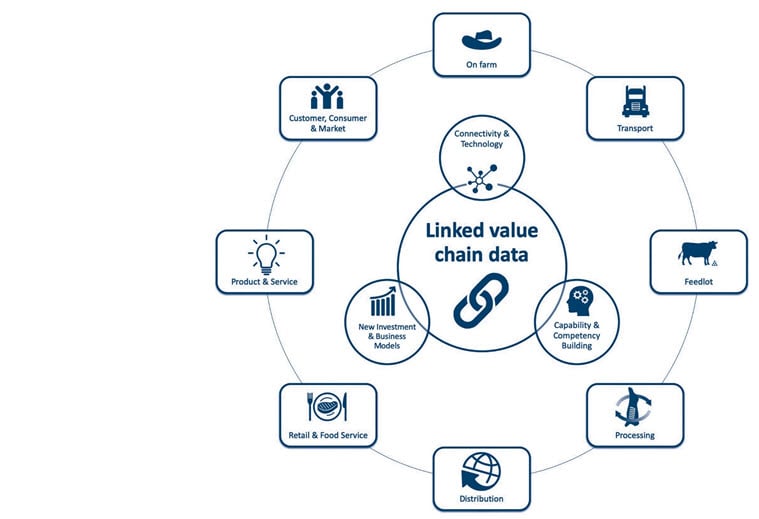What is the Digital Value Chain?
The Digital Value Chain is described as the red meat value chain that is enabled by digital technology.
Why does the Australian red meat industry need a Digital Value Chain Strategy?
Globally, digital technology and data science are advancing rapidly, and the Australian meat and livestock industries need to capitalise on these innovations.
The red meat industry’s Digital Value Chain Strategy will enable the seamless capture, integration and interpretation of the vast and increasing range and volume of data that is being generated through existing and new technologies.
The Digital Value Chain Strategy will foster the long-term prosperity of the Australian red meat and livestock industry by enabling it to increase productivity and product value across the value chain, as well as strengthening the industry’s integrity systems.
The strategy will aim to transform industry through enabling a value chain data sharing culture, which will facilitate innovative business models, increasing the agility of data driven decision making that translates into increasing value chain efficiency and profit.
Vision
The vision is that by 2025, value chain stakeholders are utilising the world’s best digital technology and connected with shared industry data.
The key principles driving investment in this strategy are about:
- Making life easier: A focus on improving the day-to-day operations of all stakeholders
- Openness: Provide the opportunity to access and reuse agreed data in more than one way to limit duplication
- Connections: there is more value in linking information than isolated silos
- Trust: Improving the trust relationship and social licence between stakeholders is critical
- Driving prosperity: Investments & new business models that enable both profitability and enjoyment
- Innovation: Facilitate the development of new solutions with limited restrictions
- Value chain focused: Utilising information within and across value chain segments.
The Strategy will deliver a range of benefits to producers and the red meat value chain including:
- Reduced paperwork
- Data driven decisions
- Useful value chain technology
- Tell our sustainability and provenance story.
The outcomes of this strategy will be:
- A virtually integrated value chain with interoperable data systems (feedback systems) from paddock to plate
- Stakeholders have the skills and infrastructure to take advantage of a digital future
- World leading data services and functionality driving value chain business decisions
- Customer trust and confidence through innovative industry integrity and sustainability systems.
